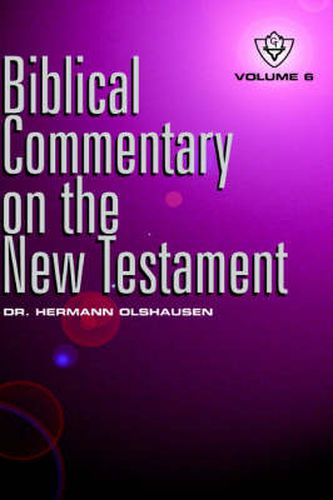Readings Newsletter
Become a Readings Member to make your shopping experience even easier.
Sign in or sign up for free!
You’re not far away from qualifying for FREE standard shipping within Australia
You’ve qualified for FREE standard shipping within Australia
The cart is loading…






Commentary on the New Testament by Dr. Hermann Olshausen. these commentaries were originally published in the mid-1800’s. OLSHAUSEN, HERMANN (1796-1839), German Lutheran theologian, was born at Oldeslohe in Holstein on August 21, 1796. He was educated at the universities of Kiel (1814) and Berlin (1816), where he was influenced by F. D. E. Schleiermacher (theologian) and J. A. W. Neander (ecclesiastical historian). He was a brother to the famous orientalist Justus Olshausen (1800-1882). In 1820 he became Privaidozent and in 1821 professor extraordinarius at Berlin; in 1827 professor at Koenigsberg, in 1834 at Erlangen. He died on September 4, 1839. Olshausen’s forte was New Testament exegesis. His Commentary (completed and revised by Ebrard and Wiesinger) began to appear at Koenigsberg in 1830. It was subsequently revised by A. C. Kendrick and was translated into English by David Fosdick, Jr. in 4 vols. (Edinburgh, 1847-1849). The editor of the North American Review (CLXXVI, Number 26; July, 1857) reported that Olshausen’s commentary on the New Testament was incomparably the best work of its kind. No other interpreter illustrates so fully the range of significance appertaining to single words, the distinctions between reputed synonyms, and the use and force of particles. To him the Greek of the New Testament seems like his vernacular tongue, and he penetrates with surpassing skill into the different modes of self-consciousness indicated in different writers by their peculiarities of diction, or in the same writer at different times by his varying phraseology. His Commentary on the first three Gospels is based on their harmony, and presents their narratives blended where they coincide, and alternating in the order of events where their materials differ. As regards the Epistles, he abjures the aphoristic style of interpretation, from which some of the most distinguished expositors from recent times have not succeeded in working themselves wholly free, and his exegesis of every single text is derived from its context, and from the main purpose of the Epistle considered as an actual missive with a definite intent. From his conclusions we often dissent, and it seems to us that he occasionally detects in St. Paul philosophic subtleties which could have had birth nowhere save in modern Germany; yet, where we cannot accept his exegesis, we never fail to derive important aid from him in determining our own (pp. 279-280). Olshausen held tenaciously to the genuineness of the four canonical gospels in an age when it was being seriously threatened by attacks from modernistic scholars. His Proof of the Genuineness of the Writings of the New Testament, which is prefixed to the commentary, is considered a classic in the field.
$9.00 standard shipping within Australia
FREE standard shipping within Australia for orders over $100.00
Express & International shipping calculated at checkout
Commentary on the New Testament by Dr. Hermann Olshausen. these commentaries were originally published in the mid-1800’s. OLSHAUSEN, HERMANN (1796-1839), German Lutheran theologian, was born at Oldeslohe in Holstein on August 21, 1796. He was educated at the universities of Kiel (1814) and Berlin (1816), where he was influenced by F. D. E. Schleiermacher (theologian) and J. A. W. Neander (ecclesiastical historian). He was a brother to the famous orientalist Justus Olshausen (1800-1882). In 1820 he became Privaidozent and in 1821 professor extraordinarius at Berlin; in 1827 professor at Koenigsberg, in 1834 at Erlangen. He died on September 4, 1839. Olshausen’s forte was New Testament exegesis. His Commentary (completed and revised by Ebrard and Wiesinger) began to appear at Koenigsberg in 1830. It was subsequently revised by A. C. Kendrick and was translated into English by David Fosdick, Jr. in 4 vols. (Edinburgh, 1847-1849). The editor of the North American Review (CLXXVI, Number 26; July, 1857) reported that Olshausen’s commentary on the New Testament was incomparably the best work of its kind. No other interpreter illustrates so fully the range of significance appertaining to single words, the distinctions between reputed synonyms, and the use and force of particles. To him the Greek of the New Testament seems like his vernacular tongue, and he penetrates with surpassing skill into the different modes of self-consciousness indicated in different writers by their peculiarities of diction, or in the same writer at different times by his varying phraseology. His Commentary on the first three Gospels is based on their harmony, and presents their narratives blended where they coincide, and alternating in the order of events where their materials differ. As regards the Epistles, he abjures the aphoristic style of interpretation, from which some of the most distinguished expositors from recent times have not succeeded in working themselves wholly free, and his exegesis of every single text is derived from its context, and from the main purpose of the Epistle considered as an actual missive with a definite intent. From his conclusions we often dissent, and it seems to us that he occasionally detects in St. Paul philosophic subtleties which could have had birth nowhere save in modern Germany; yet, where we cannot accept his exegesis, we never fail to derive important aid from him in determining our own (pp. 279-280). Olshausen held tenaciously to the genuineness of the four canonical gospels in an age when it was being seriously threatened by attacks from modernistic scholars. His Proof of the Genuineness of the Writings of the New Testament, which is prefixed to the commentary, is considered a classic in the field.